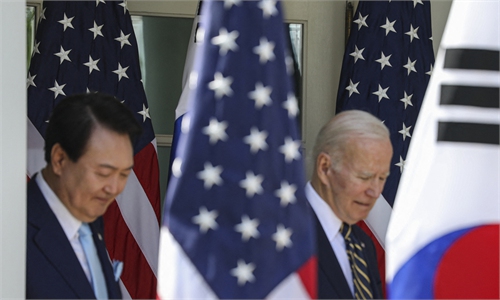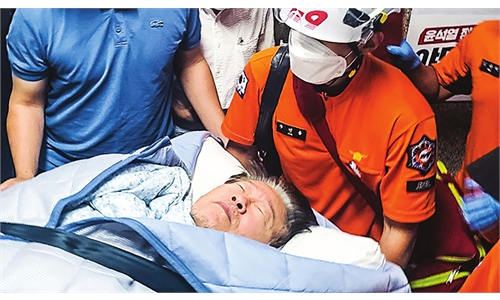S.Korea's Yoon approves motion to request parliamentary consent to arrest opposition leader as partisan conflicts worsen

Lee Jae-myung (center), leader of the main opposition Democratic Party of Korea, is transferred to a nearby hospital in Seoul by paramedics on the 19th day of his hunger strike on September 18, 2023, while prosecutors sought an arrest warrant for him over corruption allegations. Lee began the protest on August 31, citing reasons including the South Korean government's economic mismanagement and the failure to oppose Japan's dumping of the Fukushima nuclear-contaminated water into the ocean. Photo: VCG
South Korean President Yoon Suk-yeol on Tuesday approved a motion requesting parliamentary consent to arrest opposition leader Lee Jae-myung, who has been on a hunger strike for 20 days. The extreme and rare protest has further revealed that the partisan conflict in the country is deepening and polarizing, said experts.
According to the Yonhap News Agency on Tuesday, South Korean prosecutors requested an arrest warrant for Lee on Monday, shortly after the leader of the main opposition Democratic Party was hospitalized due to deteriorating health on the 19th day of his hunger strike in protest against government policies. The motion is awaiting parliamentary consent.
Although the motion is not likely to be passed by the National Assembly as the Democratic Party holds a majority, Chinese experts said that the farce is a manifestation of the deepening of the partisan conflict which has reached a very intense level in South Korea.
"On the surface, the investigation was initiated in a legal and impartial manner, but in fact it is entirely the result of a partisan dispute," Lü Chao, an expert on Korean Peninsula issues with the Liaoning Academy of Social Sciences, told the Global Times on Tuesday.
In particular, Lü pointed out that Lee is now on hunger strike against the Korean government, and Yoon authorized his arrest in order to prevent Lee's influence from expanding.
This will further deepen the divisions and social contradictions in South Korea and will also lead to more intense political standoffs in the future, Lü said.
Lee started his hunger strike on August 31 to demand a complete overhaul of Yoon's administration of state affairs, citing the South Korean government's unsatisfying passive response to the dumping of the Fukushima nuclear-contaminated water into the Pacific, among other issues.
With hunger strikes and arrest motions all over the place, analysts once again pointed out the ever-present extremes in South Korean politics.
The fact that partisan conflicts often go to extremes instead of the normal route could be seen as a feature of South Korean politics, Lü said. "This time, the situation is particularly extreme."
In addition, Yoon harbors a personal grudge against Lee in the ongoing conflict over Lee's criticisms in the past, Lü said.
Many Democratic Party lawmakers have urged Lee to give up the hunger strike. On Tuesday afternoon, South Korea's former president Moon Jae-in visited Lee in hospital and asked him to cease his hunger strike, according to Yonhap.
For Yoon, experts believe the challenges of his future ruling will be great. On the economic front, there are few favorable policies and the public sees less hope for the economy to rebound. On the diplomatic front, he has turned completely toward the US, causing relations with China and some other countries to deteriorate, Lü noted.
A new poll released by Realmeter on Monday shows that 61.8 percent of respondents - a recent record high - view the governance of the Yoon administration as poor, while only 35.5 percent favored it. Meanwhile, the support rate of the Democratic Party rose to 46 percent.


